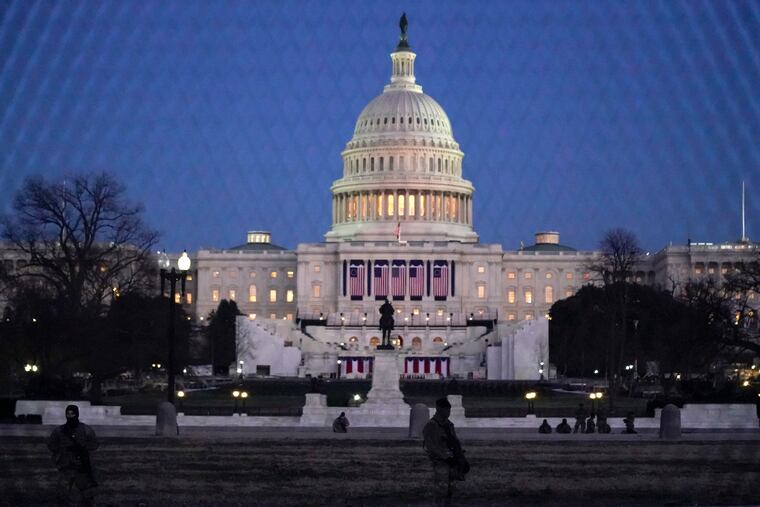How to feel less anxious about the inauguration just after an insurrection | Elizabeth Wellington
Clicking through news stories sends what-if scenarios clicking through my brain on an endless loop. How can we come down from such high levels of anxiety?

I thought I was handling my anxiety around the impending inauguration of President-elect Joe Biden and Vice President-elect Kamala Harris well.
But then I tuned into the news about what’s being done to prepare for what is traditionally a bipartisan celebration: Uniformed National Guards are patrolling the streets of Washington. Parking garages close to festivities are sealed off for security reasons. Officials are floating the idea of shutting down hotels near the U.S. Capitol. The FBI is warning of more potentially violent protests from Trump supporters.
And the threat of COVID-19 looms in the background.
I don’t think I’m much different from other Americans when I say that I’m truly shaken. Clicking through news stories sends what-if scenarios clicking through my brain on an endless loop. How could we let the behavior of a not-so-fringe group of right-wing extremists bring this country’s already high anxiety up so many notches?
I’m scared for myself.
I’m scared for the future of this country.
Here’s why the anxiety feels so big, and what you can do about it.
Fear about the inauguration is actually fear about a lot of different things
This anxiety — like all of the uncomfortable emotions we’ve been dealing with through the last 10 months — is as much about the immediate moment as it is about the future. We aren’t sure if the insurrection at the Capitol was simply the marked end of a tumultuous presidency or the beginning of a civil war. There is the fear that even when Donald Trump is out of office, the hateful seeds he planted will continue to grow like nasty weeds. Voters didn’t bargain for this.
» READ MORE: This is why the wait is so hard right now | Elizabeth Wellington
The constant stress keeps our bodies in a fight, flight, or freeze mode, said Jennifer Dragonette, a clinical psychologist and executive director of the California-based Newport Institute. The queasy stomach, lightheadedness, jitters, speedy heart rate tell us that our body is under stress. But the particular feelings around the stress makes it seem like a different experience. The coronavirus brings stress, but also our fears of death, Dragonette said. Politics brings stress, and also feelings of anger. And we’re worn down by it all. We should be over this, but we are still here.
“Our bodies were built to deal with these fears in spurts, not for long periods of time,” Dragonette said. “We’ve built up a toxic chemistry of emotions: fear, anger, and grief.”
Social media can make our anxiety worse
This is certainly not the first time our country has experienced anxiety on the eve of a presidential inauguration. Secession isn’t on the table like it was in 1861 in the weeks leading up to President Abraham Lincoln’s swearing-in. And many of us remember the collective fear around the safety of Barack Obama, back in 2008, as he became our nation’s first Black president.
While race taking center stage in America’s political drama is nothing new, experts say what’s different now is the speed at which we receive and consume endless amounts of information.
“There is a connection between anxiety and information seeking,” said Camille Burge, an associate professor of political science at Villanova University who studies the emotions around politics. “When people are anxious, they seek out news that they believe will be helpful in resolving their anxiety. However, they are most likely to seek out, remember, and agree with threatening news, and that does not lower anxiety.”
So how do we calm ourselves in the lead up to America’s 46th presidential inauguration? Some suggestions:
Step away from the information black hole. Information is key to our survival, yes. But understand the difference between keeping up and obsessing, Burge said. “You know when you are starting to go into the Wiki black hole and you start spiraling,” Burge said. “When you feel that way, stop clicking on links. Back off. Go grab some tea. Recenter. You don’t want to turn off the news forever, but you have to give your brain a chance to step back and understand things instead of inundating it.”
Notice your feelings. If you feel your heart skipping a beat while doomscrolling, change course, said Bill Holmes, a therapist and employee assistant program specialist at OptumHealth Behavioral Solutions. This is a good time to have a list of healthy coping skills that help you relax, Holmes said. I plan to do a lot of coloring this weekend. Other go-to’s: Take a brisk walk. Try a new recipe. Journal. Do a load of laundry. Just take your focus off of your stress.
Don’t brood in isolation. Depression and anxiety have a way of making you feel alone, Dragonette said. And in many ways, we are thanks to social distancing. If you are feeling overwhelmed, call your therapist. If you don’t have one, reach out to someone in your circle who lifts you up. “At times like this, we need the positive feedback that says, ‘Hey, I’m right here with you.’” Have grace with yourself, too, Dragonette said. “That might mean for this weekend, letting go of the New Year’s resolutions and doing only the things that make you feel safe and protected.”
» READ MORE: Our best Philly tips: Read our most useful stories
Expert sources
Camille Burge, Ph.D., associate professor of political science at Villanova University
Jennifer Dragonette, PsyD, executive director of Newport Institute
Bill Holmes, MS, employment assistance specialist at OptumHealth Behavioral Solutions and volunteer therapist at Black Men Heal